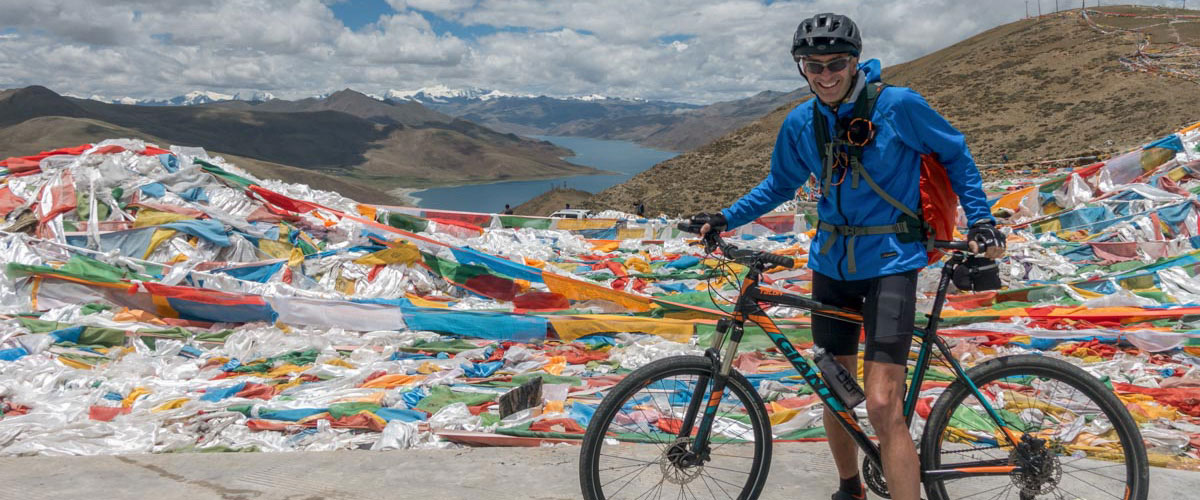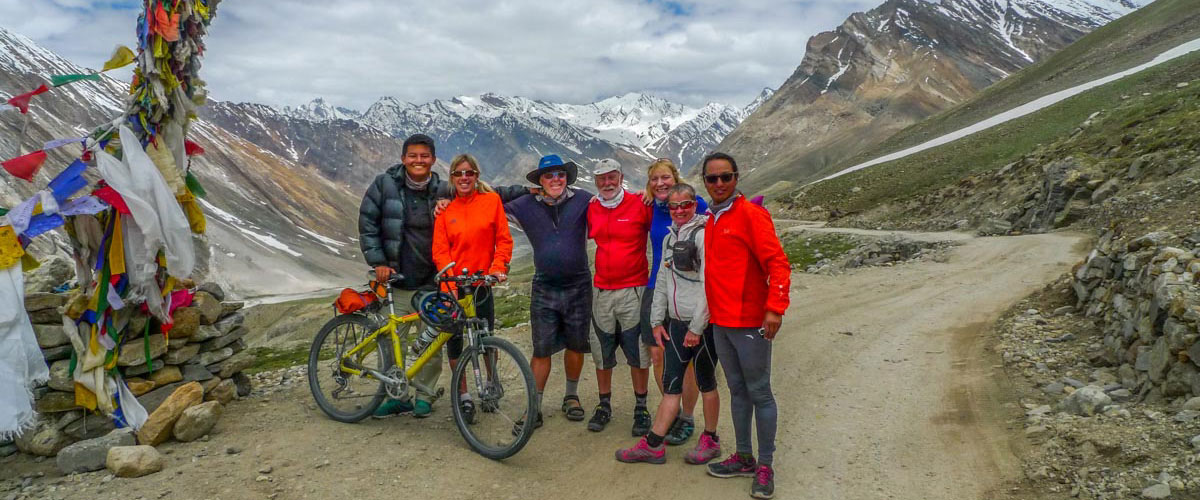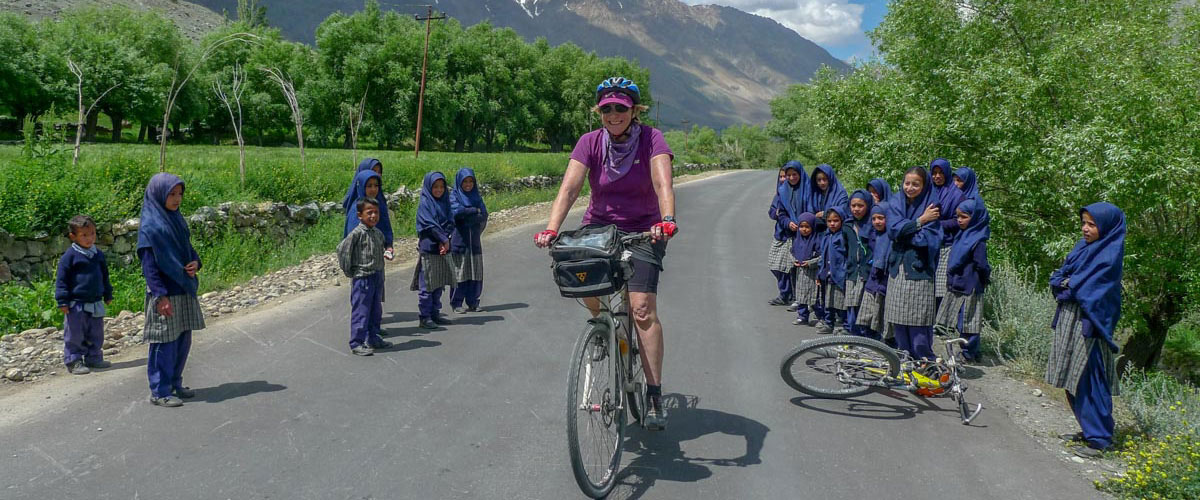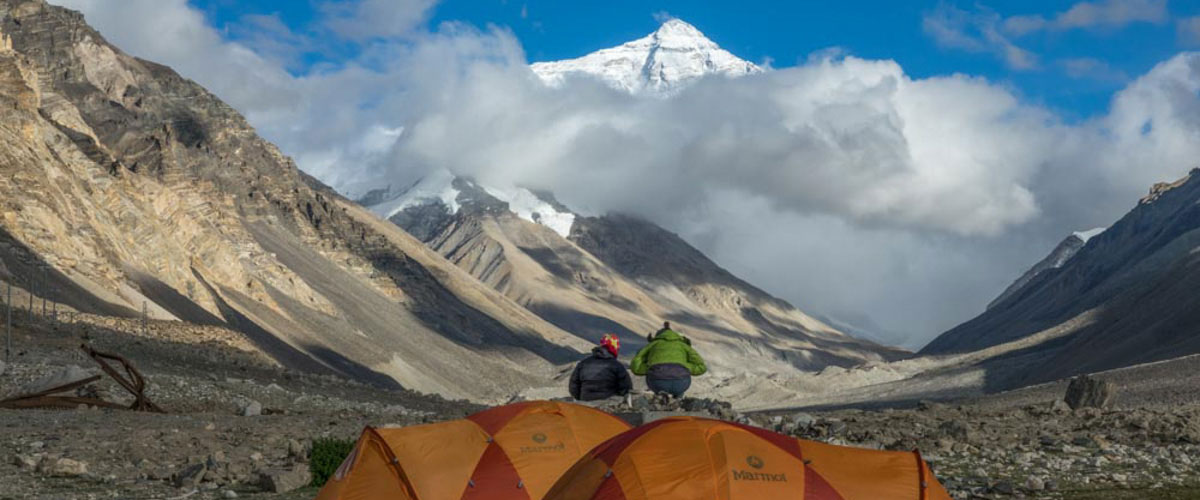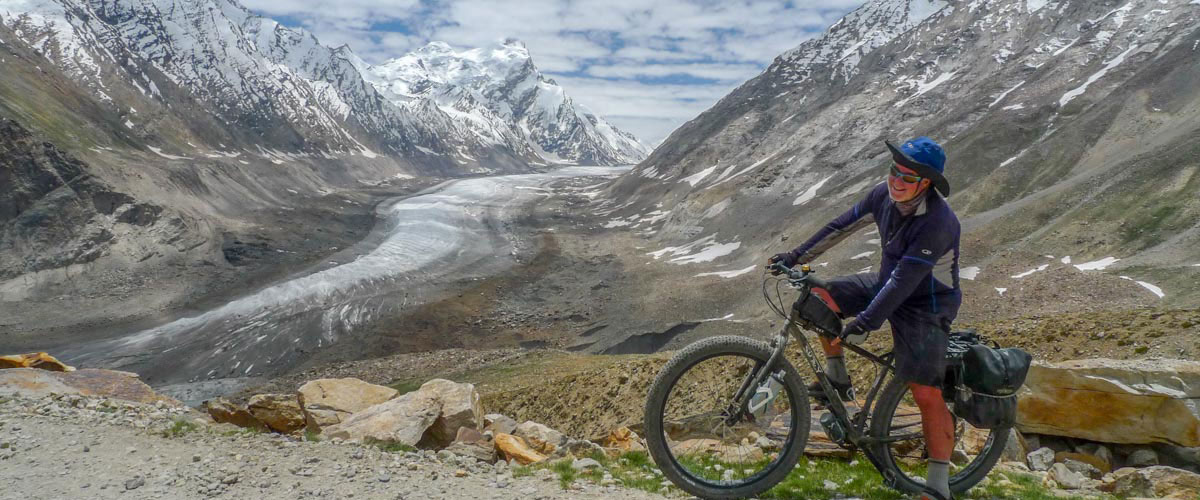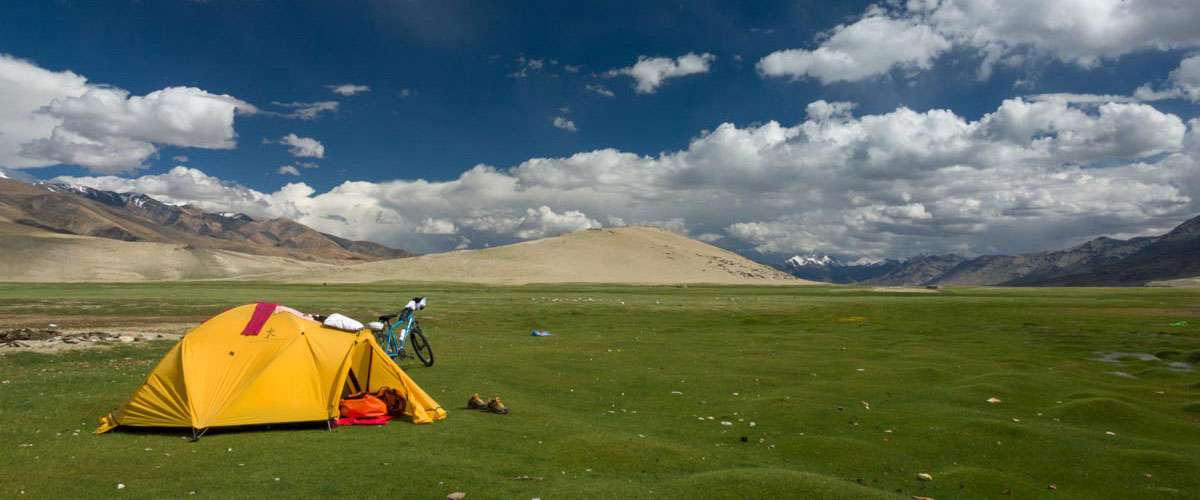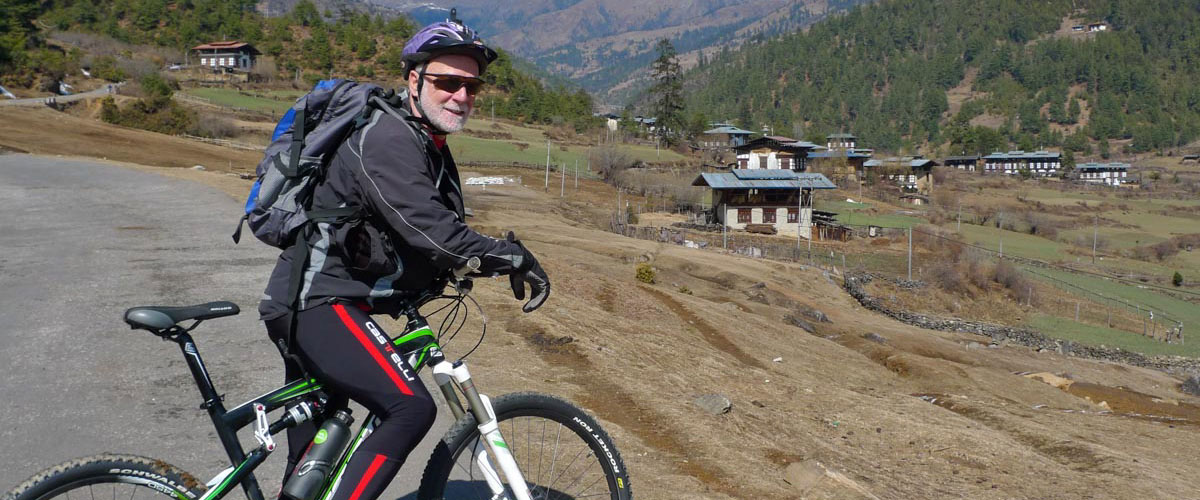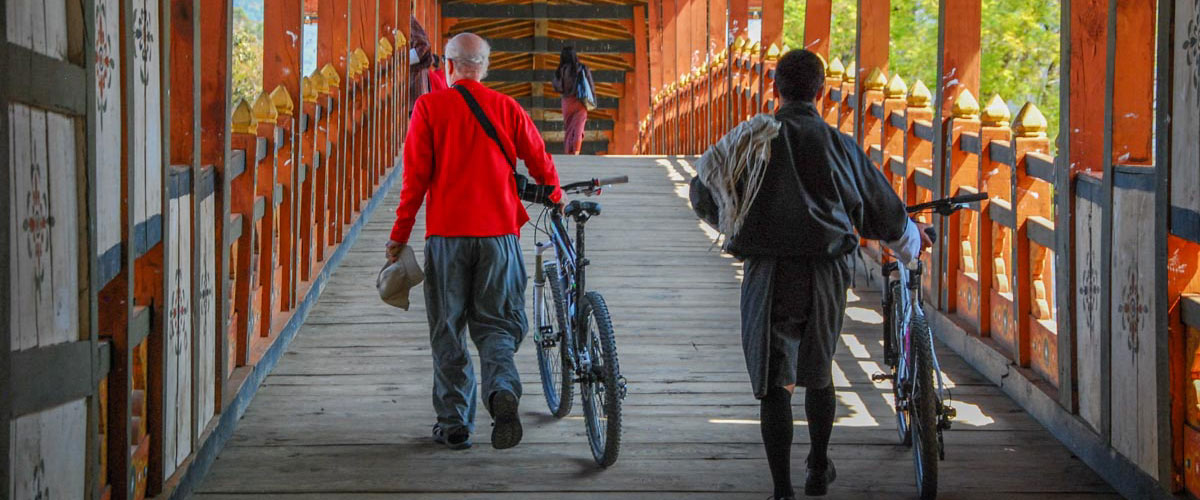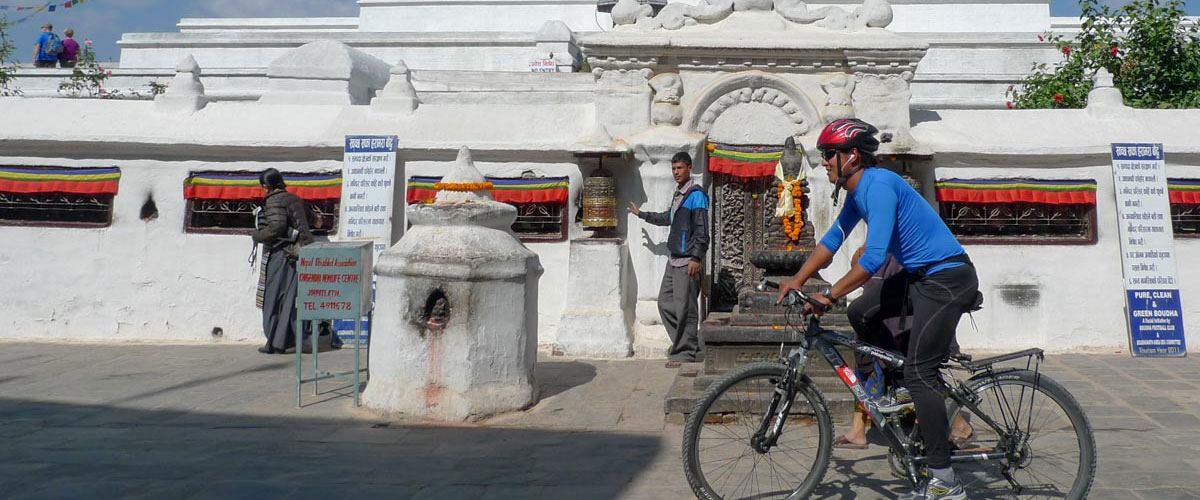The Great Pakistan Bicycle Journey | Cycling Northwest Pakistan & the KKH to the Khunjerab Pass
Join our Kamzang Journey’s exploratory bicycle through Pakistan, especially crafted by one of Pakistan’s top tour and trekking companies. With the help of Shaheen and Majeed, we have created a unique, ‘best-of’ Pakistan cycling trip following much of the ancient Silk Road, exploring Pakistan’s beautiful back roads all the way to the Khunjerab Pass on the border of western China, a true Himalayan adventure! Exploring northwestern Pakistan, especially Peshawar, Mingora, Chitral, Gilgit and the Hunza valley, by bicycle is to experience some of the true majesty, history, beauty and culture of the land and the diverse people of Northern Pakistan.
We start our journey in Islamabad, driving to Peshawar and passing through the beautiful Swat valley heading to Dir (bikes not allowed on this highway), and we begin our Great Pakistan Bicycle Journey from Bir!
Cycling the Lowari Pass (3118m) and the Shandur Pass (3720m) are highlights of this section of the bike trip, and the Chitral valley (1130m) between these two passes is a unique, singularly beautiful valley, one of the most interesting parts being the Kalasha valley, populated by Kalashas. These valleys include Birir, Bumburet and Rambur just south of Chitral. The Kalasha ( (‘Wearers of the Black Robes’) are happy people, who love music and dancing particularly on occasions of their religious festivals. They are a pagan tribe and the only non–Muslim group left in the Hindukush region of Pakistan. Legends tell of five soldiers of the legions of Alexander of Macedonia who settled in Chitral and are the progenitors of the Kalasha people.
After the strenuous climb through small villages and lush green farming areas to Shandur Pass, we’ll relax on the magnificent plateau. We continue our cycle trip through summer grazing pastures, cyckubg down to deep blue Phundar Lake, where we’ll have an opportunity to catch our own trout for dinner. The following days are relatively easy biking, passing through checkered farming valleys, beside the raging Gilgit River and along the Karakoram Highway (KKH) as we head towards the Hunza valley.
Cycling from Gilgit to Karimabad, Hunza and onto Passu, we bike along the Karakoram Highway, cycling along the ancient Silk Road and enjoying some of the most spectacular scenery in Northern Pakistan. We reach the junction of three great mountain ranges, the Himalayas, the Karakoram and the Hindu Kush!
Biking north along the KKH, we follow the Gilgit River, passing by picturesque terraced farmland and stopping at the base of Rakaposhi (7788m), looking up the Ghulmet Glacier. We explore the sublimely beautiful Karimabad, visit Hunza, with its delicious apricots and cherries, and cycle to the historic Baltit Fort and the ancient roadside Sacred Rocks at Haldeikish. Then continue to ride north through villages and farmland parallel to the Khunjerab river, past the turquoise Attabad Lake and the road edge Gulmit and Passu glaciers to Passu village with the amazing granite cathedral mountain tops as you head up the KKH to the Khunjerab Pass (4693m) one of the highest points of our bike tour and the border of Pakistan and China …
Join us for this epic bicycle journey around Central Asian Pakistan!
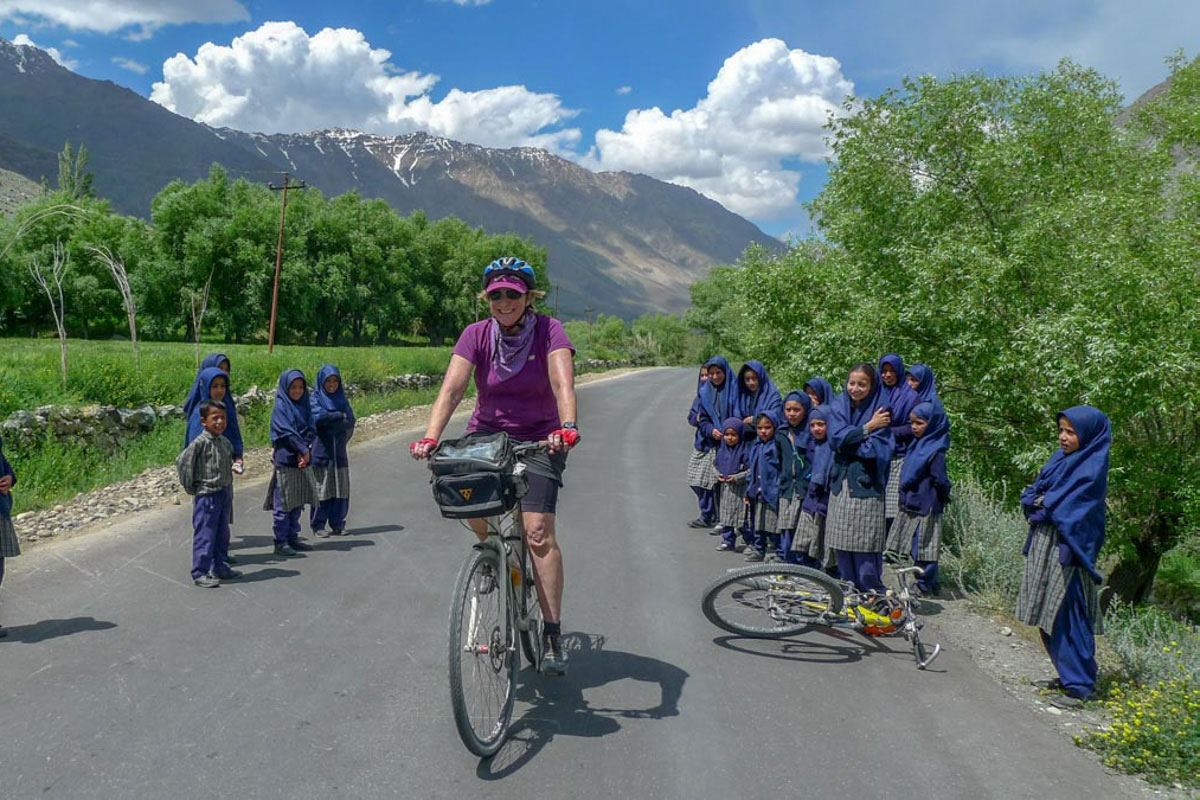
Bike Trip
The Great Pakistan Bicycle Journey | Cycling Northwest Pakistan to the Khunjerab Pass
Day 1 – Sunday, 13 June 2021 – Arrive Islamabad
Day 2 – Drive Peshawar
Day 3 – Drive Mingora Valley
Day 4 – Drive Dir
Day 5 – Bike Ayun
Day 6 – Bike Bumburet Kalasha Valley
Day 7 – Bike Chitral
Day 8 – Bike Booni
Day 9 – Bike Mastuj
Day 10 – Bike Shandur Pass
Day 11 – Bike Phundar
Day 12 – Bike Gupis
Day13 – Bike Sherqilla
Day 14 – Bike Gilgit
Day 15 – Bike Karimabad – Hunza
Day 16 – Karimabad – Hunza | Day Bike Baltit Fort
Day 17 – Bike Sost
Day 18 – Sost | Cycle Khunjerab Pass (Pakistan – China Border)
Day 19 – Bike Hunza
Day 20 – Bike + Drive Gilgit
Day 22 – Bike + Drive Naran
Day 22 – Bike + Drive Islamabad
Day 23 – Sunday, 5 July 2021 – Trip Ends
Himalaya Bicycle Trip Photos
Cycle the Himalaya
Ladakh Sky Kingdoms Cycle Trip Video | Lhakpa Dorji Sherpa
Kamzang Journeys | Ladakh Sky Kingdoms Cycling Trip
Ladakh Sky Kingdoms Cycle Trip Video | David Koelle
Kamzang Journeys | The Ladakh Great Himalayan Bicycle Trip
Lonely Planet Tibet | Cycling in Tibet
“Many of Nepal’s established trekking companies also run Tibet bike tours, notably the foreign-run Kamzang Journeys.”
Extra Days
Discuss extra days in Pakistan with us. Our Pakistan representatives would love to share their beautiful Karakoram with you.
Travel Advice
+ Purchase travel insurance with helicopter evacuation!
+ Purchase trip cancellation + travel insurance!
Itinerary
The Great Pakistan Bicycle Journey | Cycling Northwest Pakistan to the Khunjerab Pass
Day 1 – Arrive Islamabad 540m
Welcome to Islamabad, on the Pothohar Plateau, the clean and well-planned capital of Pakistan and also one of the earliest sites of human settlement in Asia. You’ll be met at the airport by a representative of Shams Alpine and transported by private vehicle to our hotel in Islamabad, either the Margalla Hotel or the Hills View Hotel. Both are close to the local markets as well as Jinnah supermarket.
Keep your bicycle boxed up as our first few days of the Pakistan cycling trip will be in the van, driving to Peshawar to avoid cycling along the busy and somewhat dangerous highway. (Hotel)
Note | Islamabad International Airport is located within the city of Rawalpindi.
Extra Day | Rawalpindi + Islamabad | Sightseeing
Optional free day with a local guide seeing the sights of Islamabad and Rawalpindi, the ‘sister city’ of Islamabad, an older city with strong colonial influences and bustling bazaars of which Raja Bazaar is the largest and most interesting. The National Art Council will be able to advise about various festivals and musical programs.
Rawalpindi Sightseeing | Liaqat Bagh Gardens, Nawaz Sharif Park, Jinnah Park, Ayub Park, Eidgah Sarif, Shah Chun Charah
Islamabad Sightseeing | Pakistan Monument, Faisal Mosque (largest mosque in South Asia + 4th largest mosque in the world), Lok Versa Museum
Day 2 – Drive Peshawar 330m | Visit Taxila, Peshawar Bazaar + Museum
Today we load our bikes and bags for the drive to Peshawar, a historical city of Khyber Pakhtunkhwa formerly known as the Northwest Frontier Province. Peshawar is one of the four administrative provinces of Pakistan, located in the northwestern region of the country along the border with Afghanistan and 16 km east of the Khyber Pass.
An ancient settlement, Peshawar has always had of great strategic importance. Bought under Muslim rule in the 10th century, it fell to the Afghans in the 16th century. Conquered by the Sikhs in 1834, it was annexed by Britain in 1849 and in 1948 became part of Pakistan. In the 1980s and 90s, Peshawar was a base for rebel groups operating in Afghanistan. The city is famous for its culture, handicrafts, carpets and leather goods.
En route to Peshawar, we will stp to explore ancient Taxila, and visit the Taxila Museum, home to a significant and comprehensive collection of Gandharan art dating from the 1st to the 7th centuries. Most objects in the collection were excavated from the ruins of ancient Taxila, one of the earliest Buddhist sites. We will cross the Indus and the Kabul rivers before arrive in Peshawar, and after lunch will explore the local bazaar and visit the expansive Peshawar Museum. (Hotel) (183 km drive)
Day 3 – Drive Mingora Valley 985m | Visit Takht-i-Bai
This morning we set off for another scenic and historic drive from Peshawar to Mingora, with several sightseeing stops en route. Mingora is a commercial city in the Swat District of Khyber Pakhtunkhwa, 2 km from the town of Saidu Sharifz. During our drive we will visit the monastic complex of Takht-i-Bai, one of the best preserved Buddhist sites in the Peshawar basin, which is located in the heart of Gandhāra. Approximately fifteen kilometers north of the city of Mardan, a Buddhist establishment which rests on three connected spurs of the Takht-i-Bai. We will have lunch at Tak-i-Bai, and before continue our drive to Mingora, on the way we see stupa, and the landscape of Dargai, Malakand Pass, Batkhella, Chakddra before we arrive at our hotel in Mingora. (Hotel) (143½ km drive)
Day 4 – Drive Dir 1420m
Today’s scenic drive from Mingora to Dir takes us through beautiful and productive farmland (onion fields), passing through incredibly scenic landscapes to reach Dir where we check into a hotel for the night. Dir (Kir Khas), in the Khyber-Pakhtunkhwa province and on the Dir River, lies at the foot of the Lowarai Pass on road to Chitral and was once a princely state. The once royal palace sits on the hill overlooking the town. (Hotel, 149 km drive)
Day 5 – Bike Ayun 1250m
After several days of driving, our Pakistan cycling journey begins! We start cycling though the 10½ km Lowari tunnel to Ayun, biking by productive orchards and colorful private gardens as we head to Ayun, in the Kunar valley, home of Prince Khush Ahmed ul Mulk. Ayun, in the Chitral district of Pakistan, is 12 km south of Chitral on the confluence of the Chitral and Bumburet Rivers, a town backed by beautiful peaks. (Hotel) (93½ km)
Day 6 – Bike Bumburet (Kalasha Valley) 1100m | Visit Kalash
Our road isn’t great, so today’s cycle will be a bumpy one as we head for Bumburet village in the renown Kalasha Valley. The three Kalasha valleys are part of the Chitral district of northern Pakistan, surrounded by the Hindu Kush range. The uinque Kalasha people, or ‘wearer of the black robes’ are happy people who love music, flowers, bright, ornate clothing and dancing, particularly on occasions of their religious festivals. They are a pagan tribe and the only non–Muslim group left in the Hindu Kush region of Pakistan, following an ancient sect of Hinduism with a unique culture and language. The Kalash religion is actually a polytheist faith where locals offer sacrifices to their gods. The Kalasha, listed as a scheduled tribe, generally don’t intermarry or cohabit with Pakistani Muslims, but there is no animosity between the Kalasha and the Muslims.
Once in Bumburet, we’ll check into our hotel and then head out by bike to visit with these lovely, interesting (and of course photogenic) inhabitants. (Hotel, 20 km)
Day 7 – Bike Chitral 1495m
From the Kalasha valley, we bike (possibly driving some of the route) drive along an incredibly scenic road to Chitral, located on the Chitral River (also knows the Kunar River) at the foot of Tirich Mir (7708m), the highest peak of the Hindu Kush. Chitral, a town rich in history, served as the capital of the princely state of Chitral until 1947, the original inhabitants arriving in Chitral as part of the Aryan invasion into South Asia. The Gandharan Grave Culture indicate its links to the Buddhist Gandharan culture and Indus Valley civilization. Kanishka, the Buddhist ruler of the Kushan empire, occupied Chitral in the third century and rock inscriptions found near the village of Barenis indicate that the area was once part of the Kabul Shahi. We’ll check into our hotel and then head out to explore Chitral’s very Central Asian bazaars, full of Afgani merchants, spices, dried produce and a exotic scents. (Hotel, km)
Day 8 – Bike Booni
A scenic day of cycling to Booni, a small village north of Chitral. Booni is a fan-shaped glacial village at the mouth of Booni’s stream, renown for its vegetable crops and fruit trees (pear, apple, grape + more). The residents of Buni are Khos, with a minority of Shina. Although Urdu isn’t their local language (theirs is Khowar, or Chitrali, and Hindu Raj), it’s spoken and understood here. We’ll check into the hotel and explore the village after a great cycling day. (Hotel) (90 km)
Day 9 – Bike Mastuj 2359m
Another wonderful day of cycling heading to Mastuj, a town belonging to the Chitral district of the Khyber-Pakhtunkhwa province of Pakistan. The valley is surrounded by beautiful hills, and the terrain has its own beauty and grandeur surrounded by lofty mountains, an ideal stop en route to the Shandur Pass and Chitral. (Hotel, 54 km)
Day 10 – Bike Shandur Pass 3720m
An epic and beautiful cycling day leaving the Hindu Kush and biking to Shander Pass which connects the Ghizer district of Gilgit-Baltistan and the Chitral district of Khyber Pakhtunkhwa, and is locally called ‘the roof of the world’ because of its altitude. Shandur Top is an extensive, flat plateau which can only be crossed between late April and early November. The grade for cycling is very gradual, and the area a network of small streams during the summer, with spectacular mountain scenery as we cycle through this remote farming region, dotted with traditional villages.
During the annual Shandur Polo Festival there are polo matches played in Shandur Polo Ground on Shandur Top, between the local teams of Gilgit-Baltistan and Khyber Pakhtunkhwa. Seven matches are played in the three days of the festival, held yearly from July 7-9 every year. (Camping, 42½ km)
Day 11 – Bike Phundar 2920m
Today we bike downhill to the sublimely beautiful Phundar valley in the Ghizer district, one of the ten districts of the Gilgit-Baltistan region of Pakistan). Ghizer is richly multi-ethnic district with three major languages are spoken (Shina, Khowar and Burushaski), as well as smaller numbers of Wakhi and Tajik speakers.The district still has living Raja (ruling) families although these days they don’t have any real power, although they do contribute to the development of the society. The Ghizer disctrict is the far northern district of Pakistan, bordering China and the Wakaan Corridor to the north. Some of the distinctive clothes in this region are the khoi, headgear of homespun woolen cloths, and the shokah, a homespun woolen cloak with long sleeves, hanging to the ankle.
Cycling through summer sheep and goat grazing pastures, we pass rural villages with their extensive wheat fields, enjoying rural Northern Pakistan scenery as we bike past Phundar Lake and on our PTDC hotel. There may be an opportunity for fishing, perhaps catching your own trout for dinner. (Hotel, 50 km)
Day 12 – Bike Gupis (Gupis Tehsil) 2200m
Today we have a beautiful day of biking heading to Gupis, a historic and lushly green town in the Ghizer district. Gupis is an active agricultural center, and a landing spot for tourism due to its connection with the Phundar, Yasin, Punial and Chitral vallies. Other nearby attractions include Khatli Lake, Gupis Fort, the Stone Circles of Megaliths and Shingalote village. The Gupis valley lies at the confluence of Hindu Kush Mountain and Karakoram ranges. (Hotel, 60 km)
Day13 – Bike Sherqilla (Sher Quilla)
Another great biking day as we make our way to Sherquilla (Sher Quilla), a village in the Ghizer district, biking past more bucolic landscapes and green summer grazing settlements as we bike. One in Sherquilla, we’ll check into our hotel for the evening. (Hotel, 70 km)
Day 14 – Bike Gilgit 1500m
Today we have a beautiful bike ride, partially by jeep as it’s a long day, to Gilgit. Gilgit, the capital of Gilgit-Baltistan, is located in a broad valley near the confluence of the Gilgit and Hunza Rivers, a hub for trekking and mountaineering expeditions in the Karakoram Range and a frontier station for local tribal areas. Gilgit was once a prominent Buddhist centre and an important stop on the ancient Silk Road, these days serving as a major junction along the Karakoram Highway connecting this region with China, Skardu, Chitral, Peshawar and Islamabad. Gilgit’s economy is mainly agricultural, growing wheat, maize, and barley as the primary crops. Once in Gilgit, we’ll check into our hotel and then head into the fascinating Central Asian-styled bazaar for some shopping … (Hotel, 56 km)
Day 15 – Bike Karimabad – Baltit (Hunza Valley) 2400m
Today we’ll enjoy the spectacular bike ride along the the Karakoram Highway (KKH) to Karimabad, originally known as Baltit, in the fabled Hunza Valley. En route, we’ll have spectacular views of Nanga Parbat, Rakaposhi, Poprush Peak and the junction of three great mountains ranges of the Karakoram, the Himalaya and the Hindu Kush. We’ll stop to see the historic site of Nomal, at the Rakaposhi and Deram viewpoints, and have views of the Hunza and Nagar valleys throughout our day of cycling. Once in Karimabad, a cultural and scenic town, we’ll check into our hotel and head out for a bit of afternoon sightseeing.
Karimabad, on the west bank of the Hunza River, is in the Northern Areas of the Pakistan, a town of walled steep terraces, deep gorges, backed by snow peaks including Rakaposhi (7600m) and Ulter Nala glacier. Karimabad was once a caravan stop for traders (including the slave trade) traveling along the Silk Route through the Hindu Kush to Kashmir. Karimabad was originally ruled by the Mir of Hunza, with the Baltit Fort function as the Mir’s palace. Baltit was the capital of the Hunza valley for over 750 years until Pakistan’s independence in 1947, when Hunza, ruled by the Mir, voluntarily joined Pakistan. Karimabad is the newer and lower capital city.
Peaks surrounding the Hunza Valley are Ultar Sar, Rakaposhi, Bojahagur Duanasir II, Ghenta Peak, Hunza Peak, Passu Peak, Diran Peak & Bublimotin (Ladyfinger Peak), all at least 6000 meters. Peaks surrounding the Hunza Valley include Ultar Sar, Rakaposhi, Bojahagur Duanasir II, Ghenta Peak, Hunza Peak, Passu Peak, Diran Peak + Bublimotin (Ladyfinger Peak), all at least 6000 meters. (Hotel, 104 km)
NOTE | Karakoram is actually a Turkic word which translates as ‘black gravel’, and was first coined by old traders to refer to the Karakoram Pass. Early European travelers the likes of Moorcroft and Hayward began to use ‘Karakoram’ to refer to the range of mountains to the west of the pass (they also used the term Muztagh). The range is now known as the Karakoram Range.
Day 16 – Karimabad (Hunza) 2400m | Baltit Fort
A free day in Karimabad to cycle to the historic Baltit Fort, spectacularly set.
Day 17 – Bike Sost 2800m
Today we will bike north from Karimabad on the KKH past Attabad Lake and road side glaciers, majestic mountains and granite peaks to the Sost valley. On the way we will stop at Hussaini suspension bridge and Passu suspension bridges and the view point of Passu glacier and cones before we arrive at our hotel in Passu village for lunch. (Hotel, 93 km)
Sost
Our last day of driving in Pakistan, we need to stop at the small settlement of Sost for the night to clear our documents for the crossing from Pakistan into China tomorrow. It’s the major customs clearance port before leaving Pakistan.
Passu 2500m
An exciting drive as we head up the Karakoram Highway, broken up by a 2-hour boat ride on a newly formed at Gulmit/Aliabad. Passu, a small village which follows the Ismaili sect of Islam, sits next to the Khunjerab River and next to the Batura and Passu glaciers. The locals speak Wakhi. In Passu, we’ll stay at the Passu Ambassador Hotel, the best in town. It’s worth spending a day in Pasu to take a hike along the beautiful and unique Batura and Passu glaciers. A 4WD jeep will drop us at Boruit Lake to start our explorations.
Day 18 – Bike Sost 2800m + Khunjerab Pass 4695m
Today we have a challenging day as we bike up the KKH to the top of Khunjerab Pass. The route becomes steeper as we are near to the top of Khunjerab Pass. We will ride from Sost to Khunjerab Pass and enjoy the great ride back down to Sost. (Hotel, 178 km)
Day 19 – Bike Hunza 2400m
This morning we ride back down the KKH 92.5 km from Sost to Karimabad, Hunza, we will make good time and enjoy the downhill ride through the beautiful countryside. (Hotel, 93 km)
Drive Karimibad – Baltit (Hunza Valley) 2500m
Back in the jeeps, we continue for about 3 hours along the Karakoram Highway to Karimibad, also called Baltit and reknown as the fabled Hunza Valley.The Karakoram Highway (KKH) has been undergoing expansion for many years, and should be finished at the end of 2014. En route, you’ll have views of Nanga Parbat, Rakaposhi, Poprush Peak and the junction of three great mountains ranges: the Karakoram, Himalaya and Hindu Kush. After the highway expansion, you’ll be able to do some additional sightseeing at Nomal, Rakaposhi viewpoint, Deram viewpoint and have a view of the Hunza & Nagar valley. Once in Karimabad we’ll check into our hotel and head out for a bit of afternoon sightseeing.
NOTE: Baltit has become a popular place to visit because of the spectacular peaks and scenery. Peaks surrounding the Hunza Valley: Ultar Sar, Rakaposhi, Bojahagur Duanasir II, Ghenta Peak, Hunza Peak, Passu Peak, Diran Peak & Bublimotin (Ladyfinger Peak), all at least 6000 meters.
Extra Day | Karimibad Explorations
We have two free days to hike around Karimibad, and explore the fantastic sites of Hunza, the most famous being the Baltit Fort. Don’t miss picking up handfuls of garnets just behind the fort! We’ll spend the second day on a Hopar Glacier trek to Nagir village, during which we’ll have stunning views of the Hispar valley, south to the Rakaposhi Range, of Diran (known locally as Golden Peak) and north to the Shimshal Mountains …
Day 20 – Bike Gilgit 1500m
Easy and joyful bike ride on KKH back to our hotel in Gilgit. (Hotel, 103 km)
Extra Day – Gilgit | Sightseeing
An extra day to explore around Gilgit. Some highlights are Kargah Buddha, located near Kargah Nallah (ravine), about 10 km from Gilgit. The buddha is a rock statue carved in the 7th century which adjoins a monastery and three stupas (about 400 meters upriver from the buddha statue). The complex was discovered in 1938.
Day 21 – Bike Naran 2409m | Cross Babusar Pass 4175m
From Gilgit to Naran we will drive and bike as we need to cover the long distance from Gilgit to Naran via the Babusar Pass, so we will bike some and drive the rest. (Hotel, 234 km)
Day 22 – Drive Islamabad 540m
From Naran to Islamabad we recommend driving as in the summer season the road is very busy with many tourists for summer vacations. (Hotel, 282 km)
Day 23 – Trip Ends | Transfer Airport
After breakfast we will visit Faysal Mosque, Islamabad Markets, and Daman-e-koh in the Margala Hills for super views over Islamabad. After a farewell lunch +/or dinner we will transfer you to the International Airport for your trip home. Thank you!
Trip Extension | Shimshal
It’s a 3-hour drive on a jeep road to Shimshal, the home village of our host, Shaheen, so we’ll spend a few days exploring the idyllic high Pamirs and Shimshal village. En route to Shimshal we’ll see Manlangutti Glacier, Dastagir Sar (7885m), Dastagir Corner 1, 11 & 111 & Malangutti Sar (all peaks). Some of the highlights of the Shimshal area are Whitehorn Peak, Korun Peak and the surrounding peaks, and there are several short day walks during which we can explore the high Pamirs, the high, green pastures, lakes and incredibly beautiful scenery. Nearby is Shuijerab, the high altitude summer pastures of the people from Shimshal.
TRIP NOTE | One year we will do a longer trek (8-9 days) over the Shimshal Pass and back to Shimshal village.
Chitral – Gilgit Polo Festival
Every year between July 7-9 there is a polo festival at Shandhur, between Chitral & Gilgit, the highest polo ground in the world. Shandhur is almost 200 km from Gilgit; en route from Gilgit you can see the traditional villages of Gahkuch, Gupis, Phandar as well as many beautiful lakes. The drive takes approximately 6 hours, and accommodation is in tents. Inquire if you are planning a private trip in July!
Highlights & Reviews
Client Highlights + Reviews
Travelers’ Comments
“I have spent a lot of time with Shams Alpine, is based in Hunza, Shimshal, Gilgit and Baltistan, I have found them to be delightful, safety conscious guides and drivers and the huge variety of magnificent scenery that they take you through is truly amazing. You will see the everyday city and village bazaars and life, the lush green fertile farming areas, high altitude National Parks with their flora and fauna in some of the most remote locations in the world. Add to that the spectacular mountains, glaciers and wild rivers of the Karakoram, Himalayas and the Hindu Kush. I have travelled with Shams Alpine a number of times, each tour in Northern Pakistan has been a delight of magnificent vistas, friendly locals, new tastes and experiences with clean, quiet accommodation.
– Private Pakistan Trip (Shams Alpine)
Trip Highlights
- Cycling along the Ancient Silk Road + the Karakoram Highway (KKH)
- Cycling to The Khunjerab Pass (Pakistan – China)
- Discover the Spectacular Hidden Karakoram with English Speaking, World Renowned Shimshali Mountain Guides
- The Bazaars + Rock Buddha Carving of Gilgit, Baltistan
- Views of Nanga Parbat (8112m)
- View of Rakaposhi (7784m), Diran (7200m), Golden Peak (7200m), Ultar Peak (7400m), Lupgar Sar (7200m) + More
- Passu, Shisper, Batura, Miar, Qoroon Peaks (All 7000+m), Hunza Valley Peaks, Rakaposhi + Diran Peak
- The Passu Cathedrals
- Baltit + Altit Forts (900 years old)
- The Traditional Villages of Pakistan
- Cycling along the 20 km, Turquoise, Attabad Lake
- A Photographers Paradise | Magnificent summer wild flowers, fruits, beautiful friendly people, glaciers, rivers, high peaks, summer flowers + fruit orchards
- Local Handicraft Shopping | Opportunities for beautiful hand-made shawls, local gems + crafts
- Expert Local Pakistani Guides
Kim Bannister Photo Gallery | Trip + Trek Photos
Kim Bannister Photography
Travel Reading | Enhance Your Trip!
Travel Books
Articles on Pakistan
The Pakistan Village with a Unique System of Philanthropy | BBC
Pakistan’s Most Wild & Beautiful Places | National Geographic
The Motorcycle Woman of Pakistan | AFAR
Pakistan’s First Social Media Star & the Forces that Enabled her Murder | NY Times
At Border of 2 Nuclear-Armed Nations: Machine Guns, Anxiety and Dancing | NY Times
Ustam Saami’s Album ‘God is Not a Terrorist: It’s Superhuman | The Guardian
Special Episode: The Jungle Prince | NY Times
Asia Bibi: I Always Believed I Would be Freed | BBC
Who are the Taliban | BBC
Date & Price
2020 Dates
13 – 4 June (22 days)
2021 Dates
13 – 5 June (23 days)
Price
$4480
+ Price for 5+ Cyclists
$4880
+ 3+ Cyclists
+ International flights NOT included (Meet in Islamabad)
+ Single supplement $250
Includes
- Kim + Lhakpa (Cycling Guides)
- Lhakpa Sherpa | Bicycle Maintenance
- Pakistani Guide
- Hotels + Camping in Pakistan
- Breakfast at Hotel
- All Meals while Camping
- Back Up Vehicle for Cycling
- Airport Transfers
- Group Transportation by Private Vehicle
- All Cycling Arrangements
Safety & Health Precautions
- Thuraya Satellite Phone
- Helicopter Evacuation Services (Excluding Cost of Evacuation)
- Oxygen saturation monitoring system
- PAC bag (portable oxygen chamber)
- Full medical kit & stretcher
- Kayadyn filtered water
- Safe, sanitary, delicious & plentiful food and drinks
Excludes
- International Flights
- Some Meals in Pakistan
- Pakistan + Chinese Visas
- Travel or travel medical insurance
- Helicopter Rescue Service Cost
- Equipment rental
- Boiled drinking water
- Alcohol & soft drinks
- Showers
- Laundry
- Tipping & other items of a personal nature
Tips & Extra Cash
Allow approx $300 for meals (while not on trek), drinks (on trek) and tips. We recommend $250 per trekker thrown into the tips pool for the crew.
Contact & Details
Kamzang Journeys Contact
Kim Bannister
kim@kamzang.com
kamzangkim@gmail.com
Mobile: +(977) 9803414745 (WhatsApp), 9863196743
On-Trek Satellite Phone: +88216 21277980 (Nepal)
Kathmandu Contact
Khumbu Adventures
hiking.guide@gmail.com
Lhakpa Dorji Sherpa Mobile: +(977) 9841235461, 9705235461
Doma Sherpa Mobile: +(977) 9841510833, 9705510833
Nuru Wangdi Sherpa Mobile: +977 9803633783 (WhatsApp)
Pakistan Contact
Shams Alpine
Shaheen + Majeed Baig
info@shamsalpine.com.pk
Tel: +92 5813 480258
Mobile: +92 3445000341
Satellite Phone
NOTE: Mobile phones + wifi work throughout much of the Everest region.We carry a satellite phone with us for emergencies. Send us a free message at the online Thuraya link below. We can call you back or email you back. If you want a return call or email include your contact info. You can send this in two SMSs if needed.
Islamabad Arrival Hotel
Margalla Hotel or Hills View Hotel
Photo Gallery | Trip + Trek Photos
Kim Bannister Photography
Visas
You’ll have to have your Pakistani visa in your passport before arrival in Islamabad. If you’re planning on exiting via Kashgar & China, you’ll also need a Chinese visa before you arrive in Pakistan.
Health Information
Pakistan Health Information
CDC
We also recommend bringing probiotics with you to help prevent infections while on trek. Doctor’s recommendation!
Travel Medical Insurance
Required for your own safely. We carry a copy of your insurance with all contact, personal and policy information with us on the trek and our office in Kathmandu keeps a copy. Note that we almost always trek over 4000 meters (13,000+ feet) and that we don’t do any technical climbing with ropes, ice axes or crampons.
Global Rescue Insurance
We recommend that our trekkers also sign up for Global Rescue services as a supplement to your travel medical insurance. You can book this directly through our Kamzang Journeys site:
Global Rescue
Medical
We have a full medical kit with us including Diamox (for acclimatizing), antibiotics, inhalers, bandages, re-hydration, painkillers, anti-inflammatory drugs etc. but please bring a supply of all prescription and personal medications. Kim has First Aid, CPR and Wilderness First Responder (WFR) certifications as well as many years of experience with altitude in the Himalaya but is NOT a qualified medic or doctor, so please have a check-up before leaving home, and inform us of any medical issues. This is for YOUR OWN safety.
DO bring all prescription medications and good rehydration/electrolytes. We advise bringing your own Diamox, Ciprofloxin, Azithromyacin & Augmentin. We have all of these with us but the Western versions are always better than the Indian equivalents.
PAC Bag + Oxygen
We carry a Portable Oxygen Chamber, or Gammow Bag, with us on many treks. There is no charge for use of the PAC bag but oxygen is $300 per canister (cost price, pass on to insurance company).
Notes on Itinerary
Although we try to follow the itinerary below, it is ONLY a guideline based on years of experience trekking in the Himalaya. At times local trail, river or weather conditions may make a deviation necessary; rivers may be impassible, snow blocks passes, and landslides wipe out trails. The trekking itinerary and campsites may also vary slightly depending on the group’s acclimatization rate or sickness.
The Himalaya are our passion, and we take trekking seriously. Although everyone is here on vacation, please come with a dollop of patience and compassion added to your sense of adventure …
Arrival Pakistan
Islamabad Arrival Hotel
Margalla Hotel or Hills View Hotel
Visas
You’ll have to have your Pakistani visa in your passport before arrival in Islamabad. If you’re planning on exiting via Kashgar & China, you’ll also need a Chinese visa before you arrive in Pakistan.
Early Arrival in Pakistan
You’ll be met at the airport in Islamabad by a representative of Shams Travels and brought to either the Margalla Hotel or the Hills View Hotel in Islamabad. If you arrive early take an extra day to explore Rawalpindi before the group arrives; there is much to see!
Note: Islamabad International Airport is located within the city of Rawalpindi.
Extra Days in Islamabad + Rawalpindi
If you arrive a few days early, consider getting a car and driver and venturing just outside of Islamabad to see some of Pakistan’s most interesting sites. It’s an hour’s drive to Taxila, the historic capital of the Gandara school of Budhism, were the ruins date back to the 8th century and there is an interesting museum and archeological site to explore. Another option is a day trip to the Murree hills, with its neogothic and Tudor architecture dating from the colonial period if it’s unbearably hot in Rawalpindi. Murree was the British Raj’s summer capital in Punjab until 1864 and is now a popular tourist spot in the western Himalayan foothills (2300m). Summers are much more pleasant here than in the steamy capital …
Other options are a 3-hour drive to the Khewra salt cave or a 2-hour drive to visit Peer Sohawa, a fantastic viewpoint to look down on the twin cities of Islamabad and Rawalpindi.
Gear
Kamzang Journeys Products
Duffel Bags, T-Shirts, Camp Towels, Buffs, Leather Passport Wallets, Totes & Bags, Himalayan Textile Pillow Covers & More!
Kamzang Journeys Products
Bicycle
Will you rent or bring your own? Many airlines allow a bicycle packed in a bike box for no extra charge. Emirates is on that list. Rentals are from bicycle shops in Leh, relatively good quality mountain bikes.
NOTE: You can bring a mountain bike or a touring bike on most roads in the Indian Himalaya, and use fat tires or touring tires. There are advantages to both types of tires, and no bike will be perfect for all terrain. Most roads are paved, often very badly, although we will be cycling on some unpaved roads and jeep tracks.
+ See Gear tab
Bicycle Maintenance
You are responsible for knowing something about the maintenance of a bicycle although we have cyclists with us who are adept at fixing bike issues, and Lhakpa is a pretty good bike mechanic. If you don’t know anything, we recommend having a quick session at your local bike shop to know how to repair punctures and learn a few basics.
Duffel Bags
We have Kamzang Journeys large orange duffel bags for $50! Please inquire early as we need to bring from Kathmandu.
Rentals
We have Western down jackets to rent for $1.50 per day. We also have good super-down sleeping bags to rent (0 to -10 F) for $2.50 per day.
Packing + Storage
It’s easiest to pack and unpack from a duffel bag, especially when the temperature drops. Best to invest in a strong, waterproof duffel such as a North Face. You can store extra gear in Leh at the hotel.
Shopping
You can get some trekking gear in Leh, such as trekking poles, sleeping bags (about 0F), light down jackets, Chinese-made gear which is often quite wearable. Top up your gear in Leh if you need to, but best not to rely on purchasing too much there.
On Your Bike
You will need to carry certain things with you while riding, and the extras you can store in our back-up vehicle. In your daypack (or panniers) you will need:
- Helmet & warm hat
- Warm, windproof jacket & tights
- Warm, windproof cycling gloves
- Wind &/or rain jacket
- Lightweight synthetic or down jacket
- Camera
- Water
- Small bike-repair kit (extra tube, puncture repair kit, multi-tool, lube | chain oil)
- Headlamp
- Small medical kit
- SPF lip balm & sunscreen
- Polarized sunglasses
- Snacks
Other Gear (Optional)
- Pedals
- Saddle
- Bike shoes
- Panniers
- Bike tubes (specifically sized for your bike tires)
- Spare tire
- Spare wheel set
- Spare RD hanger
- Brake pads (extra pair if you still use pads)
Gear List
This is a guideline, not a bible, for the gear you will need on the trek. Ask if you have questions! One 15 kg (33 lbs) maximum weight limit for the duffel bag for flights. 20 kg (50 lbs) weight limit for treks.
- Small daypack | Biking pack
- Sleeping bag (-20F/-30C recommended)
- Thermarest (Air mattress)
- Sneakers, Keens or light shoes (city, evenings)
- Crocs (camp + washing)
- Cycling tights
- Cycling T-shirts
- Cycling L/S shirts
- Cycling windproof jacket
- Cycling gloves
- Cycling socks
- Cycling beenie (hat)
- Down jacket
- T-shirts (city)
- Pants or skirt (city)
- Fleece or thermal jacket (evenings, city)
- Fleece or thermal top (evenings)
- Fleece or thermal bottoms (evenings)
- Lightweight Gortex jacket & pants (wind & rainproof)
- Lightweight long underwear (to sleep in or layer under clothes)
- Socks (evening, city)
- Gloves (evening)
- Thermal hat
- Down booties (optional, recommended)
- Sunglasses (2, bring extra pair)
- Water bottles
- Bladder (optional)
- Toiletries, sunscreen with SPF, lipbalm with SPF & personal medical supplies
- Watch (or small clock with alarm)
- Extra batteries & battery chargers
- Headlamp (2, bring extra)
- Laundry Detergent (Lhasa) or Bio-degradable Soap
- Hand Sanitizer
- Books
- Zip-lock bags
- SOFT toilet paper or tissues (we supply Chinese toilet paper but you’ll want something softer for blowing your nose)
- Baby-Wipes | Wet-Wipes OR Chux (for washing)
- Rehydration | Electrolytes
- Snacks!
Medical + Suggested MEDS
We have a full medical kit with us including Diamox (for acclimatizing), antibiotics, inhalers, bandages, re-hydration, painkillers, anti-inflammatory drugs etc. but please bring a supply of all prescription and personal medications. Kim has First Aid, CPR and Wilderness First Responder (WFR) certifications as well as many years of experience with altitude in the Himalaya but is NOT a qualified medic or doctor, so please have a check-up before leaving home, and inform us of any medical issues. This is for YOUR OWN safety!
Suggested prescriptions + meds: Dexamethasone, Nifedipine + Diamox (altitude), Azithromycin, Ciprofloxacin + Augmentin (antibiotics), Compeed or blister bandages, Tegaderm, bandages, tape, antibiotic ointment + Betadine (Povidone-Iodine ointment) (wounds + cuts), knee + ankle supports/braces (if required), ACE bandage for sprains + strains. Bring whatever pain meds you generally use (Ibuprofen, Paracetamol/Tylenol, Diclofenac), meds for diarrhea (Loperimide/Immodium) and nausea (Ondansetron), antihistamines (non-drowsy, and Benadryl is ok for a drowsy one that might help with sleep), as well as any medications that you take regularly or that your doctor prescribes. We recommend picking up a combination salmeterol and fluticasone inhaler in Kathmandu, good for (from a doctor trekking friend “high altitude cough due to reactive airways, which is kind of like temporary asthma. The ingredients in the inhaler relax the bronchial passages and calm inflammation in the airways.”
Stay away from sleeping medications, drugs in the codeine-opiate-narcotic family and other drugs that suppress your breathing (not a good at altitude). And don’t forget electrolytes! – have some with you in your pack (as well as snacks) every day please …
We’re happy to take excess medical supplies off your hands when you leave if you won’t need them and pass them on to others. We use lots of the large amount we have with us to treat locals as well as our own trekkers…
Comments on Gear
On our cycling trips in the Indian Himalaya we stay in tents at our Kamzang campsites. For sightseeing and visiting monasteries you will want other shoes and comfortable clothes. Mornings and evenings are always chilly in the Himalaya, even in the summer, while days can be scorching.
Nights are chilly to cold, so a down jacket and a WARM sleeping bag are essentials. We recommend a down sleeping bag of 0 to -20 F (-18 to -28 C). Campsites near passes can get COLD. Rentals are available although they are only about 0 to -10F. The dining tent is a Tibetan style ‘yurt’, with rugs, blankets and camp chairs on the ground. It warms up in the evenings with everyone inside and hot tea but it is still important to have warm clothes for the evenings. Down booties are great when it’s cold, a down jacket is essential, and down or synthetic pants are also nice to have.
Crocs for washing and the evenings are also very useful. Wear a pair of warm socks under them for going in and out of the dining tent which is a ‘shoes off’ zone. Tevas take a long time to dry, not recommended.Good, polarized sunglasses are essential; please bring an extra pair if you tend to lose them! Don’t forget a sun hat &/or baseball cap and have plenty of sunscreen and lip balm with SPF!
Tents
Everyone gets their own 3-person dome tent without a single supplement. Singles have a 2-person tent and couples share a larger, 3-person version.
Water
We bring KATADYN expedition-sized water filters along on the trek for fresh drinking water, ecologically the best way to get water in the Himalaya’s fragile trekking regions. Bring your own filter pump, Steripen/UV purifier or iodine/chlorine tablets for fresh water while trekking. NOTE: To be extra safe with your drinking water, you can drop one purifying tablet into your water bottle after filling with our filtered water. Make sure you wait the required amount of time before drinking, and don’t add anything with Vitamin C as this negates the iodine.
Please bring at least 2 Nalgene, Sigg or other unbreakable plastic or metal water bottles. Camelbacks and other bladder systems are great for cycling.
Snacks
You will need snacks at altitude, even if you’re not a snacker. Energy bars, ‘GU’ gels, chocolate bars, dried fruit & nuts, beef jerky (or whatever) are important to have along for long days, pre-lunch bonks and passes. Lemonade mix, Emergen-C or similar drink mixes are great to have for hot days in your water bottles, and it is ESSENTIAL to bring electrolytes with you every day.
Bring something to share in the tent in the evenings if you want. Cheese is great as a treat on a cheese-board before dinner (Blue, Stilton, Yarlsburg, good Cheddar, Brie, etc). If you would like, bring a bit of your favorite and we’ll throw it on a cheese board for appetizers one night.
NOTE: Nothing besides your personal snack food is required, but it’s fun to see what everyone comes up with! Almost all basics available in Kathmandu, so no need to over-load.
